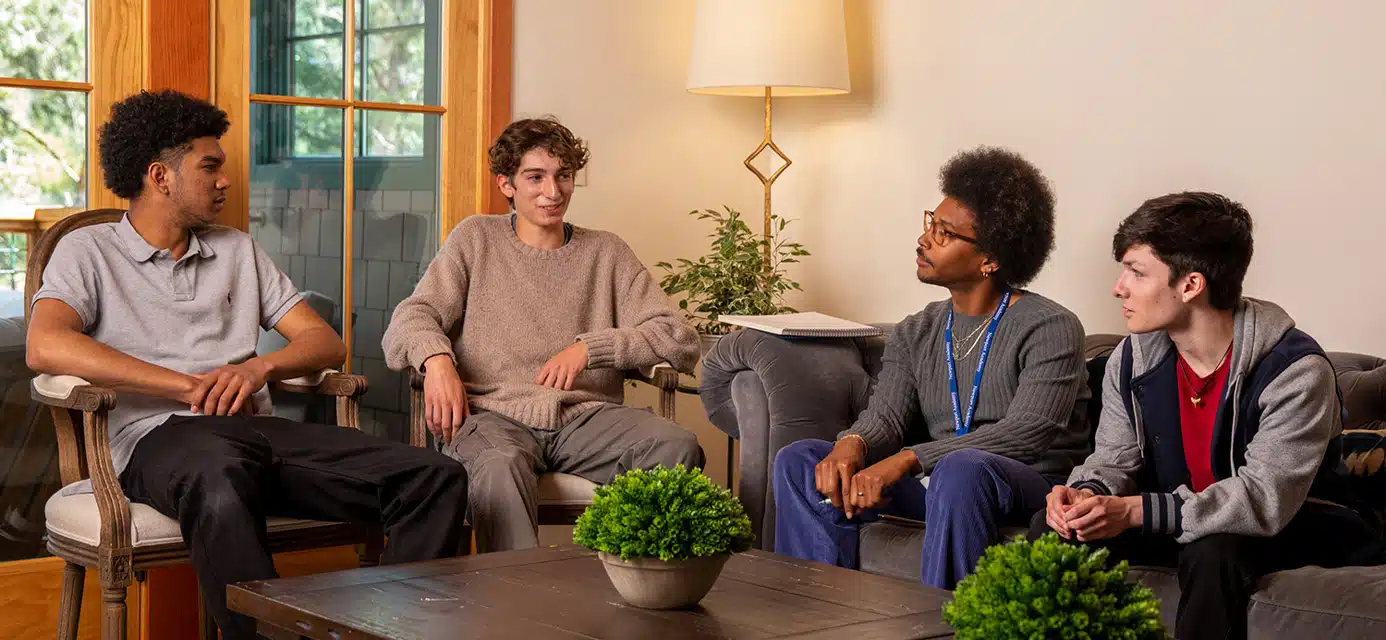Adolescent counseling is counseling (or therapy) specifically for children and teens who need help with their mental health. Child and adolescent counseling is beneficial to truly any young person. But for those who suffer, it’s critical. Mental health counseling can prevent adolescents from experiencing mental health crises and also help those in need of extra mental health support.
Adolescent counseling is essential for an adolescent who is dealing with anxiety, depression, or trauma. Substance use in adolescents is a serious issue that needs to be addressed in adolescent counseling. Moreover, children and adolescents who are discovering their sexual orientation or experiencing gender dysphoria can benefit from child or teen therapy.
For the purposes of this article, we will use “counseling” and “therapy” as well as “counselor” and “therapist” interchangeably, although they are different. Read on to learn what adolescent counseling is, the benefits of teen counseling, the different types of counseling, and how Newport Academy supports adolescents who require mental health treatment. We’ll also answer the question “How do I know if my teenager needs counseling?”
Key Takeaways
- Adolescent counseling should always be provided by a licensed, professional counselor.
- There are many different types of teen therapy that include individual, group, family, trauma, and experiential modalities.
- Benefits of teen counseling include better emotion regulation, stronger family relationships, and higher self-esteem.
- The main difference between counseling and therapy is that counseling typically addresses a specific issue while therapy is a more in-depth approach to heal underlying trauma.
What Is Adolescent Counseling?
There are various types of child and adolescent counseling. When an adolescent is having trouble with their mental health, it’s important for parents to consider adolescent therapy with clinical mental health counselors. School professionals are also among the first to notice when a teen can benefit from adolescent counseling.
Clinical mental health counseling for teens can include the involvement of family members, usually parents or other guardians/caregivers. There are also various types of professional counseling for adolescents. All adolescent counseling should be facilitated by trained and licensed clinicians in the counseling profession.
Why Is Child and Adolescent Counseling Important?
Child and adolescent counseling gives kids and teens a safe place to work through mental health challenges. If mental health issues go untreated, adolescents could end up in crisis. Counseling can avert crises. Teenage counseling can also support the well-being of children who aren’t in crisis but could benefit from additional support.
Adolescence is an intense stage of life. As they move through the stages of adolescence, hormonal changes and puberty can wreak havoc on teens’ physical and emotional well-being. There are many external factors disrupting the mental health of today’s teens, including social media, constant stimulation, fear about world events and climate change. In addition, adolescents deal with perennial issues like peer pressure, self-esteem issues, and bullying.
Counseling for teens helps adolescents learn healthy coping skills and set realistic goals. Clinical mental health counseling provides a safe space for teens to explore distressing thoughts and emotions, work through childhood trauma, and build stronger connections with family members.
Types of Adolescent Counseling
There are various approaches to adolescent counseling. Different modalities of therapy work better for different people. It’s important for parents to find a counselor who does adolescent specialization and has years of experience working with adolescent populations.
At Newport Academy, we offer many different types of therapy and clinical mental health counseling. Some of these types of therapy are:
- Individual therapy
- Family therapy
- Group therapy
- Trauma therapy
- Experiential therapy (art, music, play therapy, Equine and Adventure)
Individual Therapy
In individual therapy, adolescents receive counseling tailored to their individual mental health needs. The child and adolescent therapist, who is clinically trained to work with young people, will work directly with the client in individual child and adolescent therapy sessions.
Family Therapy
Another type of therapy that is available to adolescents is family therapy. This is often a good option for family members who are concerned about their adolescent’s mental health. Clinical mental health counselors that specialize in family therapy will work with the family’s dynamics as part of treatment. At Newport Academy, we believe family involvement is an essential aspect of achieving long-term healing from adolescent mental health issues.
Group Therapy
In group counseling, adolescents get the chance to relate to other young people who are experiencing similar mental health challenges. Clinical mental health counselors trained in group dynamics provide a safe setting for children and adolescents to share their experiences with each other and the therapist. This type of therapy helps adolescents feel less alone and to receive therapeutic benefits from their peers as well as the mental health counselor.
Trauma Therapy
Trauma counseling for teens can be done in an individual setting or group counseling setting. Adolescent trauma is, unfortunately, common for many of our clients. All clinical mental health counseling at Newport Academy is trauma informed. This means that we treat every one of our clients as if they have experienced trauma, because most of them have in some form. We use language and interventions that are designed to make the adolescent feel safe and avoid trauma triggers.
Experiential Therapy
There are many ways to conduct adolescent counseling that aren’t just talk therapy. At Newport Academy, we offer a variety of experiential therapies. These include professional counseling modalities such as yoga and meditation, Equine-Assisted Learning, music therapy, art therapy, Adventure Therapy, fitness activities, horticulture therapy, Mixed Martial Arts, culinary arts, and community service (depending on location). All these different modalities are avenues for adolescent counseling that aren’t traditional therapy but can be just as beneficial for child and adolescent mental health.
Teenage Counseling Techniques
We’ve already discussed the different types of therapy for adolescents, but let’s dive a little deeper into how child and adolescent counseling works. When counselors work with adolescents, they start by building a rapport with their clients. The therapeutic relationship is one of the most important, if not the most important, part of therapy. If the child or adolescent doesn’t trust the therapist or feel safe in their care, no progress will be made.
Counselors work with teens to set goals. Moreover, they use a wide range of modalities, including:
- Cognitive techniques such as Cognitive Behavioral Therapy (CBT), an evidence-based type of therapy that focuses on thoughts, feelings, and behaviors and usually provides tangible coping skills to adolescents
- Dialectical Behavioral Therapy (DBT), which helps adolescents build distress tolerance
- Mindfulness approaches to support teens in relaxing their bodies and calming their minds
- Motivational Interviewing to engage teens in adolescent counseling and build their motivation for healing
- Experiential therapies, including art, music, and outdoor activities

Teen Counseling vs. Therapy: What’s the Difference?
The main difference between counseling and therapy is that counseling tends to be short term and focused on a specific goal, while therapy is usually a more in-depth and longer process that helps clients work through past experiences.
However, therapy and counseling are often used interchangeably. Moreover, counselors and therapists are both licensed and trained professionals. And both counselors and therapists can use talk therapy as well as other adolescent counseling modalities.
Adolescent Counselors
Teen counselors are typically focused on the present. They tend to be goal oriented and focus on each client’s strengths. Counselors help clients relieve distressing mental health symptoms and help their clients feel better.
Teen Therapists
Adolescent therapists help clients work through underlying trauma in order to live more fully in the present and work towards a better future. Therapists help clients process thoughts and feelings, both past and present, that are influencing their behaviors and the way they navigate the world.
The Benefits of Child and Adolescent Counseling
We’ve already established that child and adolescent counseling is beneficial to both the child and their family members. Here are some of the specific ways teenage counseling helps kids become happier, healthier, and more resilient.
Building Emotional Regulation
Learning to regulate their emotions is important for teens as they grow into young adults. Emotion regulation can be difficult for teens with developmental disabilities, mood disorders, personality disorders, eating disorders, and addictions.
Healing from Trauma
Adolescence is a time in which teens’ brains are still forming. Without treatment, acute or chronic trauma can stunt brain development and put adolescents at a disadvantage as they grow up, negatively impacting them for the rest of their lives. Symptoms of trauma and PTSD include flashbacks, nightmares, dissociation, feelings of terror, and physical pain.
Growing Self-Worth and Self-Compassion
It’s important for teens to develop a greater sense of self-worth. Many adolescents have low self-esteem which could lead to depression and suicidal thoughts. Learning self-compassion can help adolescents be kinder to themselves and develop a greater sense of self.
Repairing Family Relationships
Teen therapy is particularly impactful when family is involved. Family therapy tailored toward adolescents, such as Attachment-Based Family Therapy, can restore ruptures between parents and children. These ruptures might be the result of early childhood trauma or may have developed during the teen years while the adolescent was struggling with mental health issues.
Gaining Healthy Coping Skills
Learning healthy coping skills to navigate challenges and discomfort is another benefit of adolescent counseling. Clinical mental health counselors can help adolescents find new, healthy ways to manage difficult family dynamics, depression, anxiety, and other challenges and triggers.
Supporting Teens’ Growth and Development
Counseling for children and teens also supports adolescent development. There are different developmental milestones that adolescents need to reach in order to move on to the next stage of the teen years. Counseling can help teens meet their developmental goals by working through each stage of development and its effects on social, behavioral, and emotional development.
How Do I Know If My Teenager Needs Counseling? 10 Signs to Watch For
Sometimes it’s not always clear when an adolescent needs counseling. Teens are still figuring out life and how to cope with distressing symptoms related to trauma, depression, anxiety, substance use, and eating disorders. Here are a few warning signs to watch for that may indicate that a teen needs adolescent counseling:
- Persistent feelings of hopelessness
- Feeling sad, depressed, angry, or anxious
- Having difficulty focusing
- Talking about thoughts of self-harm, death, or suicide
- Significant changes in eating habits
- Changes in behavior
- Isolating themselves
- An abrupt drop in grades
- Extreme mood swings
- Self-destructive behaviors
If you are a school professional and you notice an adolescent displaying any of these warning signs, get in touch with the family right away and recommend teen counseling. If you’re a family member seeing your teen display any of these signs, seek help from a mental health professional, specifically a child and adolescent counselor.

Adolescent Counseling at Newport Academy
At Newport Academy, we approach adolescent counseling in a comprehensive, integrative way. Moreover, we treat the entire family system, not just the individual teen receiving therapy. We work with families and offer both residential and outpatient services, depending on the needs of the adolescent. Our nationwide locations include teen treatment programs in Northern and Southern California, Washington State, Utah, Texas, Wisconsin, Minnesota, Pennsylvania, Maryland, Connecticut, Virginia, and Georgia.
Parents of teens don’t have to navigate this stage of their lives alone. Therapy is a great option to support teens’ mental health. At Newport Academy, we support young people ages 12–18 to build healthy emotional regulation, form a strong sense of self, and make positive connections with peers and mentors. Contact us to learn more and find out about availability in our teen counseling programs.
Frequently Asked Questions About Child and Adolescent Counseling
Child and adolescent counseling is crucial for adolescents who are struggling with their mental health. If an adolescent begins to show signs that they’re having a difficult time with their mental health, counseling can help avert crises and let the adolescent learn healthy coping skills, emotion regulation, and distress tolerance.
Adolescent therapy occurs when an adolescent meets with a therapist or counselor to address their mental health needs. Child and adolescent counseling provides tools, resources, and a safe space to process past trauma, cope with current distressing symptoms, and avert crisis.
Adolescent counselors work specifically with teens to help them manage their mental health or a diagnosed mental illness. Counselors use different types of modalities, such as individual or group talk therapy, family therapy, trauma therapy, or experiential therapy.
Changes in behavior such as isolating themselves, poor sleep, and lack of motivation can be signs that a teen is struggling. Teens who express sadness or hopelessness, engage in self-harm, or talk about suicide should be assessed immediately by a mental health professional.






